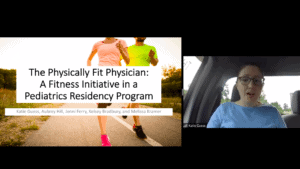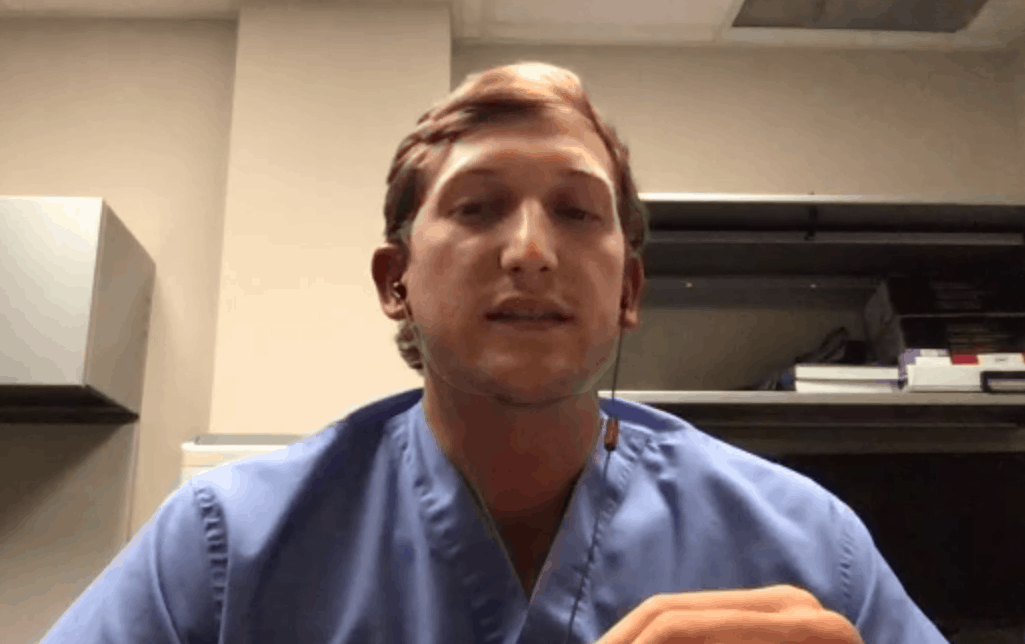Office of Interprofessional Education Hosts Virtual Quality Improvement Conference
| The Office of Interprofessional Education (IPE) hosted its second annual Quality Improvement for Advanced Learners Program (QIALP) conference via Zoom on June 24.
QIALP is a quality improvement program designed to train advanced learners, such as residents and fellows, to work effectively on interprofessional teams. Each team includes two faculty facilitators, said Wendy Ward, Ph.D., director of interprofessional faculty development.

Wendy Ward, Ph.D., director of interprofessional faculty development in the Office of Interprofessional Education, welcomes employees from UAMS, Arkansas Children’s Hospital, Baptist Health and University of Texas Health Sciences Center at Tyler to the QIALP conference.
“This program started with our interest in improving the work we do, improving health outcomes, improving patient care and really trying to drive and sustain a culture of continuous improvement,” said Ward, adding that residency directors approached IPE and asked if a course could be developed to teach residents those skills.
This year was the first time the program included institutional partners, Ward said.
The tops teams from UAMS, Arkansas Children’s Hospital (ACH), Baptist Health and the University of Texas Health Sciences Center at Tyler presented their projects during the virtual conference.
Derrick Henry, M.D., a resident physician, worked with David Kelley, D.O.; Simon Mears, M.D., Ph.D.; and Steven Cherney, M.D., on UAMS’ top presentation, “Orthopedic Add-on Case Delays, a Quality Improvement Project.”
Henry’s focus was on delays in the operating room, specifically with urgent or emergent orthopedic cases. His goal was to reduce case delays by 20% by September 2020.
He found three major causes for the delays — communication errors from anesthesia, orthopaedics or medicine; communication errors from ancillary staff; and logistical errors.
Over six months, UAMS saw 130 case delays with 13% as a result of communication errors from anesthesia, orthopaedics or medicine. He focused his improvement efforts on that area.
Henry is still compiling data on the results of the newly implemented changes. The decrease in surgical cases because of COVID-19, along with new potential delay causes in relation to preoperative testing requirements, left him unable to gather usable data for several months.

Kimberly Guess, M.D., M.P.H., a resident at Arkansas Children’s Hospital, presents “The Physically Fit Physician: A Fitness Initiative in a Pediatrics Residency Program.”
Kimberly Guess, M.D., M.P.H., a resident at ACH, presented “The Physically Fit Physician: A Fitness Initiative in a Pediatrics Residency Program,” a project in which she implemented physical fitness programs designed to target suspected barriers that kept residents from being physically active. Her goal was to increase the time residents spend participating in physical activity by 10% per week.
Guess developed four programs — offering residents free access to Faculty Fit stations, implementing a residency-wide step competition, allowing early dismissal for inpatient team residents and a physical fitness photography competition. The first three programs were implemented, while the photography competition was derailed by the COVID-19 pandemic.
She found that access to the Faculty Fit stations and the residency-wide step competition both contributed to an increase in the amount of time residents participated in physical activity.
The other remaining oral presentations were:
- Chandra Lingisetty, M.D., MBA, MHCM, from Baptist presented “Reducing Readmission Risk with Med to Bed Prescription Delivery at Baptist Health Medical Center,” about efforts to reduce hospital readmissions by ensuring prescribed medications are filled at the hospital before the patient is discharged.
- Jeffery Bell, M.D., from the University of Texas Health Science Center at Tyler, presented “Transitional Care Management,” which explored a better way to transition a patient’s care from hospital to home through the use of transitional care visits.
A video of the presentations, as well as poster presentations from the rest of the participating teams, is available on the IPE website.
